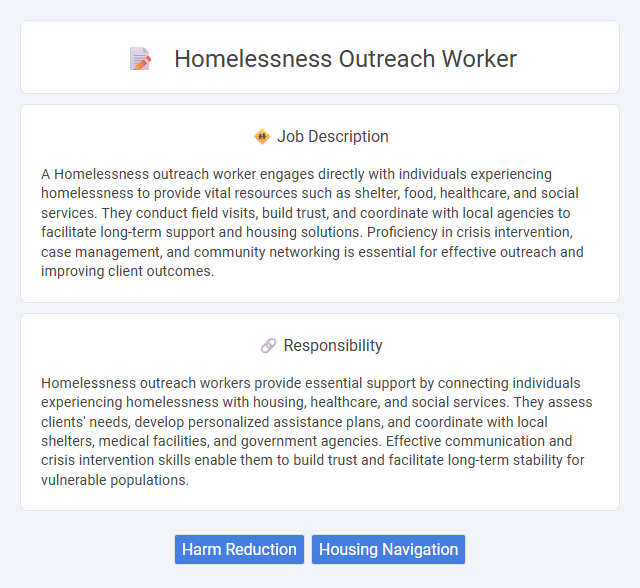
A Homelessness outreach worker engages directly with individuals experiencing homelessness to provide vital resources such as shelter, food, healthcare, and social services. They conduct field visits, build trust, and coordinate with local agencies to facilitate long-term support and housing solutions. Proficiency in crisis intervention, case management, and community networking is essential for effective outreach and improving client outcomes.
Homelessness outreach workers often encounter individuals facing extreme poverty, mental health challenges, and substance abuse issues, which require patience and strong emotional resilience. Those with empathy, excellent communication skills, and the ability to navigate crisis situations might be more suitable for this demanding role. People who struggle with high-stress environments or lack problem-solving skills may find this job less compatible with their strengths.
Qualification
A Homelessness Outreach Worker must possess strong interpersonal skills and deep knowledge of social services programs to effectively connect individuals experiencing homelessness with critical resources. Qualifications typically include a degree in social work, psychology, or a related field, alongside experience in case management, crisis intervention, and community engagement. Certification in mental health first aid or substance abuse counseling enhances the ability to provide comprehensive support in challenging environments.
Responsibility
Homelessness outreach workers provide essential support by connecting individuals experiencing homelessness with housing, healthcare, and social services. They assess clients' needs, develop personalized assistance plans, and coordinate with local shelters, medical facilities, and government agencies. Effective communication and crisis intervention skills enable them to build trust and facilitate long-term stability for vulnerable populations.
Benefit
Working as a homelessness outreach worker likely offers profound personal fulfillment by providing direct support to vulnerable populations. This role may enhance skills in crisis intervention, communication, and resource coordination, increasing career versatility. There is a probability of contributing significantly to community well-being and influencing positive social change through effective engagement.
Challenge
Homelessness outreach workers likely face significant challenges in building trust with individuals experiencing homelessness due to trauma and distrust of authority. They probably encounter unpredictable and sometimes unsafe environments while providing support and resources. Navigating limited resources and systemic barriers may also pose ongoing difficulties in effectively assisting clients toward stable housing.
Career Advancement
Homelessness outreach workers gain valuable experience in social services, mental health support, and crisis intervention, positioning them for career advancement into case management, program coordination, or social work roles. Developing strong skills in client advocacy, resource networking, and community engagement enhances opportunities for leadership positions within nonprofit organizations or government agencies. Continuing education and certifications in behavioral health or public administration further increase prospects for specialized roles and higher-level management in homelessness support services.
Key Terms
Harm Reduction
Homelessness outreach workers specializing in harm reduction provide vital support by connecting individuals experiencing homelessness with resources that minimize risks associated with substance use and unsafe living conditions. Their work involves distributing clean supplies, offering education on safer drug use, and facilitating access to healthcare and social services to improve overall well-being. Emphasizing non-judgmental engagement, these workers reduce harm and promote stability without requiring immediate abstinence, making critical impacts in community health.
Housing Navigation
Homelessness outreach workers specializing in housing navigation assist individuals experiencing homelessness by identifying suitable housing options and coordinating access to essential services. They conduct comprehensive assessments, develop personalized housing plans, and liaise with landlords, social service agencies, and healthcare providers. Expertise in local housing policies, rental assistance programs, and crisis intervention techniques is critical for facilitating successful transitions into stable living environments.
 kuljobs.com
kuljobs.com